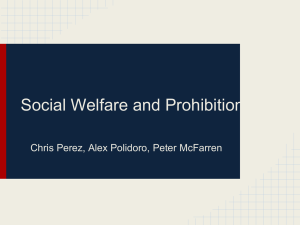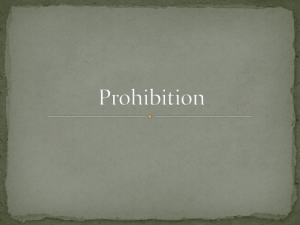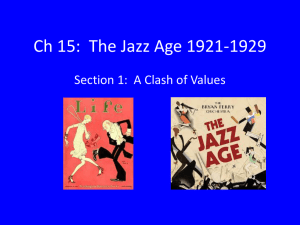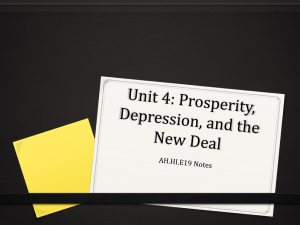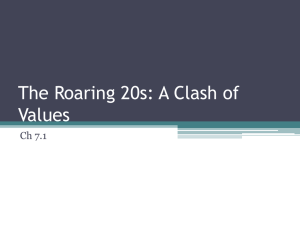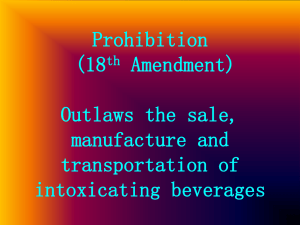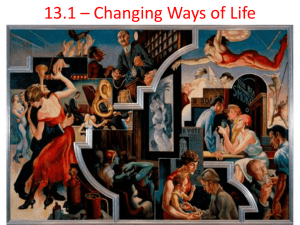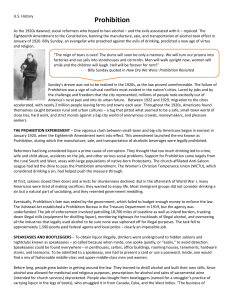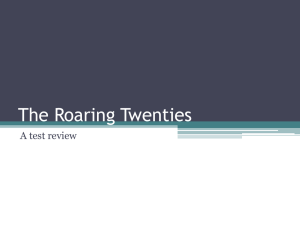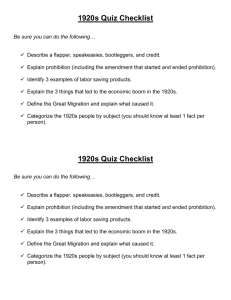Prohibition
advertisement
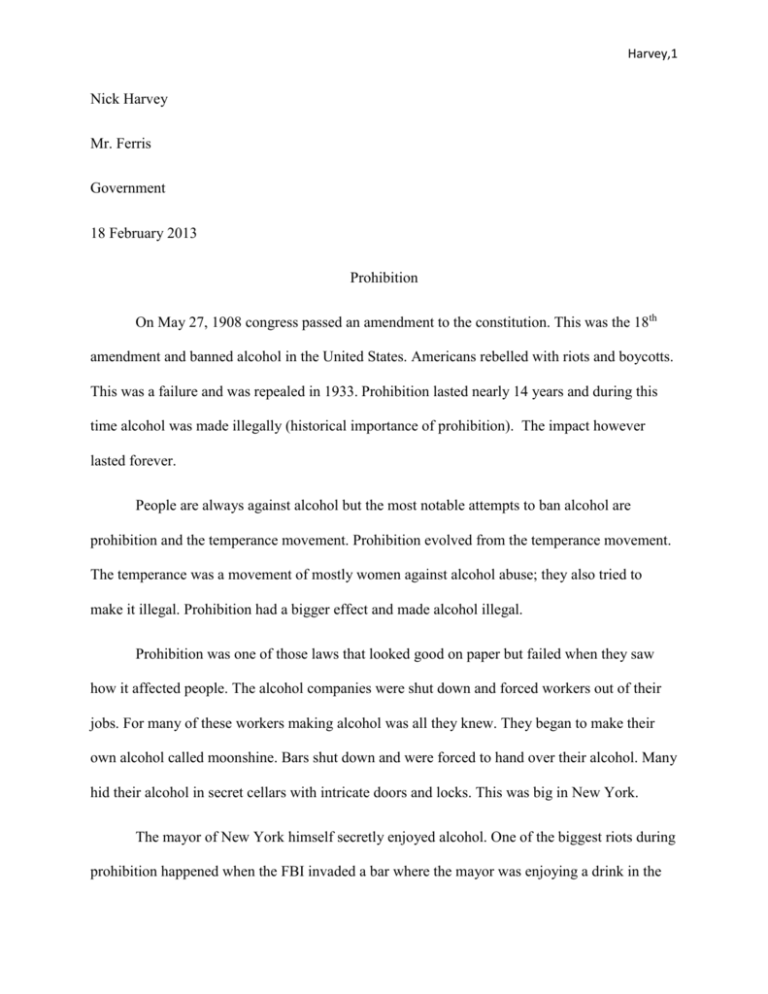
Harvey,1 Nick Harvey Mr. Ferris Government 18 February 2013 Prohibition On May 27, 1908 congress passed an amendment to the constitution. This was the 18th amendment and banned alcohol in the United States. Americans rebelled with riots and boycotts. This was a failure and was repealed in 1933. Prohibition lasted nearly 14 years and during this time alcohol was made illegally (historical importance of prohibition). The impact however lasted forever. People are always against alcohol but the most notable attempts to ban alcohol are prohibition and the temperance movement. Prohibition evolved from the temperance movement. The temperance was a movement of mostly women against alcohol abuse; they also tried to make it illegal. Prohibition had a bigger effect and made alcohol illegal. Prohibition was one of those laws that looked good on paper but failed when they saw how it affected people. The alcohol companies were shut down and forced workers out of their jobs. For many of these workers making alcohol was all they knew. They began to make their own alcohol called moonshine. Bars shut down and were forced to hand over their alcohol. Many hid their alcohol in secret cellars with intricate doors and locks. This was big in New York. The mayor of New York himself secretly enjoyed alcohol. One of the biggest riots during prohibition happened when the FBI invaded a bar where the mayor was enjoying a drink in the Harvey,2 underground cellar. The mayor called the New York police from the cellar and told them to get rid of the FBI. The police and FBI had a standoff and the FBI left. The mayor continued to enjoy his alcohol. In urban parts of the country people didn’t have it so good. Many were living off of little to no income. Many made moonshine and sold it for income. This was very hard because they had to transfer it, make it, sell it, and store it without being caught. They also had to make their own stills with little money. This was a problem because without proper equipment the alcohol could become tainted (Severn, 108). The government had to enforce laws stricter and increase punishment to discourage people from alcohol. This only led to more people using alcohol and even got the involvement of the mafia. The mafia opened secret bars with complex systems to keep alcohol away from being found. Many bars even had spotters watching for federal agents. Some even had shelves that fell into sewers and alcohol pits. If a spotter spots an agent the people would down there drinks and throw them into a hole in the floor that is covered by a trap door. The bartender would also hit a button releasing the bottom of the shelves and dropping the bottles into the sewer. There were many other systems that kept alcohol away from the eyes of the government (prohibition). A bar called 21 Club went even farther with its intricate systems. The club had a secret cellar hidden behind hooks where meat would normally be hung. The doors lock had to be unlocked by a meat skewer in one of several holes in the wall. Even once unlocked the door was embedded into it foundation and weighed 2 ½ tons. Another thing was the cellar was located building next to 21 Club. They did this so if anyone was asked if there was any alcohol on the premise they could truthfully say no (wine cellar history). Harvey,3 The stricter laws were taking a toll on many urban moonshiners. More moonshiners where being caught and arrested because of the stricter enforcement of the new law. More and more people were losing homes and property because they didn’t have money. The economy began falling. The economy got so bad the government stepped in and tried to create jobs. The government tried countless times to get the economy back on track. The government began to lose states and Utah made the government realize, there was no other choice they had to repeal the 18th amendment (Salt lake Tribune, Pg.1). The amendment was repealed on December 5, 1933 with the 21st amendment. Many new alcohol companies formed from people that made their own to making it legally. This opened us many job opportunities. These new companies had a hard time starting with the little money they had so many investment were made in the companies. The companies also paired up with older former big alcohol companies. The day after prohibition was repealed many drank themselves to death with alcohol poisoning. Many bars that once operated in secrecy now could relax and serve alcohol legally. The stage was set for alcohol companies to flourish. Many new companies made millions in early years after prohibition but then slowly lost sales and went out of business. This happened because so many people were buying alcohol after prohibition because they were now allowed to. It is similar to individuals today. They can’t have alcohol until they are 21 and are always curious about it. Once they turn 21 they buy alcohol and keep buying it but as they get older they tend to slow down their buying of alcohol. This theory can be applied to anything such as gambling. Harvey,4 Works Cited "Historical Importance of Prohibition." About.com 20th Century History. About.com, n.d. Web. 20 Feb. 2013. <http://history1900s.about.com/od/1920s/p/prohibition.htm>. "Prohibition." History.com. A&E Television Networks, n.d. Web. 18 Feb. 2013. <http://www.history.com/topics/prohibition>. "Prohibiton Articles & Newspapers." Prohibition Articles. Archives, n.d. Web. 18 Feb. 2013. <http://www.archives.com/genealogy/newspaper-genealogy-prohibition.html>. Severn, Bill. The End of the Roaring 20's: Prohibition and Its Repeal. New York: Julian Messner, 1971. Print. "Wine Cellar History." 21 Club, New York City / Famous NYC Restaurant with Banquet Rooms. Orient Express, n.d. Web. 19 Feb. 2013. <http://www.21club.com/web/onyc/wine_cellar_history.jsp>.
